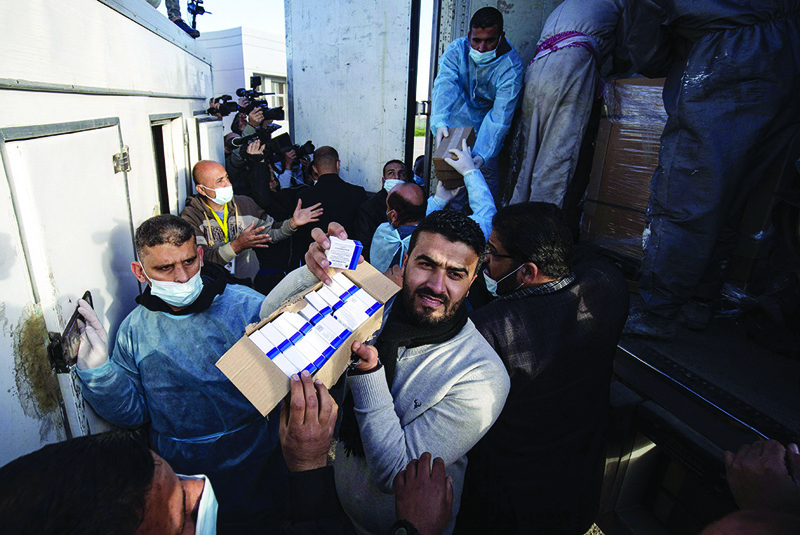 GAZA: Workers unload boxes of Russian-made Sputnik V vaccine doses from the UAE from a truck upon its arrival in the Gaza Strip via the Rafah crossing with Egypt yesterday. - AFP
GAZA: Workers unload boxes of Russian-made Sputnik V vaccine doses from the UAE from a truck upon its arrival in the Gaza Strip via the Rafah crossing with Egypt yesterday. - AFPTEL AVIV: Israel took a step towards normalcy yesterday, re-opening a raft of businesses and services from pandemic lockdowns, but with some only available to fully vaccinated "green pass" holders. Nearly three million people, almost a third of Israel's population, have received the two recommended doses of the Pfizer/BioNTech coronavirus vaccine, the world's quickest inoculation pace per capita.
With a steady flow of data proving the Pfizer vaccine's efficacy in stopping serious illness from Covid-19, Israel's government has begun gradually easing restrictions in place since December, when it imposed its third lockdown. Shopping malls and stores with street access re-opened yesterday, with certain limitations on crowd size. But gyms, swimming pools, hotels and some cultural facilities are re-opening only to those who have been fully vaccinated and obtained the so-called green pass.
Israel's green pass scheme is being closely watched as a possible model for how other economies might re-open once a substantial part of the population is vaccinated, while stirring controversy over unequal access for those who opt out of the jab. Lifting weights at a gym in Petah Tikva near Tel Aviv late Saturday, Prime Minister Benjamin Netanyahu insisted Israel was moving ahead "with caution", while imploring "everyone to get vaccinated".
Standing at the entrance of a posh Tel Aviv gym, 90-year-old Ora Davidovicz said she "couldn't wait" to go swimming. "It's been almost a year since I went to the pool," she told AFP. "I've been counting the days. "All I have to do is put on my swimsuit," she said, before heading in. Tom John, a muscular 33-year-old, told AFP he'd been training at home for months but felt safe being back at the gym with the protection systems in place. "Everyone here has a green badge," he said, surveying the gym.
As of yesterday, nearly 3.2 million Israelis were eligible for the green pass, according to the health ministry. That includes 2.5 million people who had their second shot more than a week ago, as well as nearly 700,000 people who have recovered from COVID-19.
At the family owned Katalina shoe store in central Tel Aviv, Mordechai Nazarian said his business had been closed for eight of the last 12 months, with "little openings here and there" as Israel lifted restrictions between lockdowns. "We hope this one is the right one," he told AFP.
At the Third Ear record store in Tel Aviv, 32-year-old Itay Shimon said he hadn't been in a record store in many months, but was enjoying just browsing the aisles. Describing himself as a vaccine supporter, he also voiced caution about compelling people to get the jab. "We cannot force those who don't want it to do it," he said.
Israel, which has one of the world's most sophisticated medical data systems, secured a substantial stock of the Pfizer/BioNTech vaccine by paying above market price and by striking a data-sharing deal with the drug giant. Netanyahu is hoping the successful vaccine procurement and rollout will boost his support ahead of March 23 elections, Israel's fourth vote in less than two years.
Meanwhile, round 20,000 coronavirus vaccine doses from the UAE arrived in Gaza yesterday, a delivery reportedly orchestrated by a rival of Palestinian president Mahmoud Abbas three months before scheduled Palestinian elections. The Russian-made Sputnik V doses entered Gaza via the Rafah crossing with Egypt, AFP journalists said - meaning they did not pass through Israel, which has maintained a tight blockade on Gaza since 2007.
Last week, Mohammed Dahlan, a former top member of Abbas's Fatah party now exiled in the United Arab Emirates, announced the delivery of the vaccines as a "generous grant" from Abu Dhabi. Dahlan, currently a security adviser to Abu Dhabi Crown Prince Sheikh Mohamed bin Zayed Al-Nahyan, has claimed credit for the delivery, which some Palestinians are seeing as a political move ahead of May and July legislative and presidential polls.
A statement yesterday from a dissident branch of the Fatah party Dahlan controls said the vaccines were for "medical teams" in Gaza, which has not yet begun a general vaccination campaign. Analysts are watching Dahlan's moves closely ahead of the Palestinian elections, the first since with 2006, amid speculation he may try to mount a challenge to Abbas' camp.
A first batch of vaccine doses arrived in Gaza this week, part of a Sputnik V supply secured by the Abbas-controlled Palestinian Authority. The PA has said it will share its supply with Hamas in Gaza. That shipment was sent by the PA from the occupied West Bank through Israel, which had initially blocked its delivery to Gaza.
The Israeli military department responsible for civil affairs in the occupied Palestinian territories (COGAT) has said that it requires "political" instructions before allowing vaccines into the coastal enclave, where Israel has fought three wars against Hamas since 2008. Both Hamas and the PA have accused Israel of violating international law by stemming the free flow of vaccines into Gaza. Meanwhile, rights groups and the UN have called on Israel, currently the world leader in vaccinations per capita, to ensure that Palestinians in Gaza and the West Bank are vaccinated. - AFP










